Comfort Read online
Page 2
Eventually, that happened. She opened her light blue eyes, her eyes the very blue of my father’s, and said, “I love you, Mama.” Although I cannot tell you that my knees stopped trembling then, I can say that my heart soared. “Gracie!” I said, bending to cover her with kisses.
The doctors told us she was fine. A high fever, now almost normal, had caused a seizure. She would have to spend the night. A neurologist would have to check her again in the morning. But then she would go home and be back at school by Monday. My trembling then was from relief as I held her hand all the way up to the fifth floor, where a bed and a grape Popsicle were waiting for her. A nurse told us about the great video library down the hall. She told us where we could find tea and coffee, crackers and instant soup. She brought us blankets so we could sleep there with Grace.
But all the time she spoke, I watched Grace. Her fever, monitored on a screen, was beginning to rise again. “I’ll get some more Tylenol,” the nurse said, cheery in her mauve uniform with teddy bears dancing across the top.
“Something’s not right,” I said out loud, as Grace’s eyes grew distant and her Popsicle melted down its stick.
Just then, a family friend who is a doctor there stopped in to say hello. Lorne had called him during all the tests at the ER even though he’s an orthopedic surgeon, not a pediatrician. On rounds that night, he decided to check in on us.
“Look who’s here,” I told Grace. “Andy Green.” The Greens had been our friends since their daughter and Sam were three years old. But Grace didn’t seem to recognize Andy at all.
He turned around, fast, and called down to the ICU. The next thing I knew, a team of doctors and nurses burst into the room, surrounding us. I looked up, and Lorne and Andy were standing in the doorway crying. “What’s happening?” I screamed. Our friend could only cry and say, “Grace is very very sick.”
The doctor who seemed to be in charge, barking orders at the others, looked me right in the face and said, “Your daughter is not going to make it.”
I think I actually laughed at her, at the impossibility of a healthy five-year-old girl getting a fever, having all of those scary tests come back fine, and then dying. No. I laughed at her, at the impossibility of such a thing happening to my Gracie.
“We need to intubate her,” the doctor barked at me.
I had watched too many television medical shows and suddenly I felt like I was in the middle of one.
“You have to help us,” the doctor told me, and suddenly I was holding an oxygen mask over Grace’s face and asking her to count to ten. She did. In perfect Chinese, which she studied at her kindergarten. See how special she is, I wanted to shout, but no one was paying attention to me.
“What is going on?” I screamed at the doctor.
But they were pushing me out of the way now, and racing with Grace suddenly hooked up to needles and machines, down to intensive care. I ran after them, yelling Grace’s name. “Mama’s here!” I yelled. I kept yelling even though an elevator door yawned open and took her away from me.
THERE IS A ROOM off the pediatric ICU where families wait for news. A chaplain came to us there. Then a social worker. I knew from when my father was in the hospital dying from lung cancer five years earlier that they were the staff in a hospital who prepared families for death. The room is ugly. It smells like yesterday’s pizza. I could not stay there and wait, or listen to these long-faced people with their gentle voices and psychological babble.
Instead, I kept running through the automatic double doors to the doorway of the trauma room where Gracie lay, naked and vulnerable on a gurney, as people worked on her hour after hour. I saw her new pink-flowered baby doll pajamas on the floor, and I wished someone would notice them too and pick them up. She would need them when she got out of here, I told myself. Whenever someone saw me there, they would shout for me to go away. Eventually, I lay down right there, in that doorway. A nurse took me by the arms and made me get up. She found a chair for me and pushed it into the corner of that trauma room and ordered me to keep quiet.
In my flip-flops and short-sleeved shirt, I began to shiver in that cold room. Watching Grace’s blood pressure drop to the point where they were losing her, then rise again; watching them try different combinations of drugs; listening to them shout, to machines beep and blare. And all I could do was watch and whisper, “Gracie, Gracie, Mama’s here,” from my vinyl chair in the corner. From time to time, they let my husband or me close enough to stroke her forehead, to whisper “I love you” in her ear.
At one point that same doctor looked at me and said, “This is going to be the longest night of your life.” So many times after Grace died I have wanted to call that doctor, perhaps in the middle of a night, to tell her that she was wrong. In fact, that was only the first of months and months of long, endless nights, gripped by fear and grief. Nights that seemed endless. Nights that only led to mornings without Grace there.
But that night did end. And sometime the next morning, as they continued to work, I managed to catch someone’s attention long enough to beg for an explanation. “What is going on? What’s wrong with Grace?” No one had bothered to tell us that one of the blood tests taken the afternoon before in the ER came out positive for strep. And not just the run-of-the-mill strep that gave kids sore throats. This strep had mutated and entered her bloodstream. No one can explain why that happens. Sometimes it just does. Later we would learn that in a five-week period that spring, five children in Rhode Island and Massachusetts died from this same form of strep. Statistically, we were told, this was not unusual.
But that day, when I heard that innocuous word, I felt something like relief. Antibiotics cured strep. I knew that. But then came the worse news. The strep was not the problem. The problem was that this particular strep ravaged the organs. Even once the bacteria was under control, the damage it did was almost always fatal. I kept shaking my head, I kept saying no. I kept thinking about how two days ago Grace was making a bouquet from myrtle and chives, twirling in her tutu, showing off her latest art project.
At one point, a tall doctor came in to tell us that he needed to operate on Grace’s arm. She was too fragile, he said, to move to an operating room, so he would perform the surgery right there, in the trauma room.
The tall doctor put his hand on my shoulder. “I’m going to try to save the arm,” he said.
“What?” I said. I could feel the wildness in my eyes.
But he was already walking away. After an agonizing hour or more, he returned. Strep was everywhere, he said. But Grace had survived the operation.
He had used the word fragile. I knew that. But while I waited for him to return, I did not once think she might not live through the surgery. For someone who admired her own ability to listen and store information, I seemed suddenly to know nothing, to understand nothing.
Hours passed. The tall doctor came in to tell us that Grace needed another operation. This time he felt she was stable enough to go to the operating room.
“I’m going to try to save the arm,” he said again.
I thought, Grace is going to lose her arm. She will have only one arm and it will be terrible but she will be home with us and we will figure out how to make it okay. I thought of books I’d read where children survived attacks by sled dogs or cancer of the face. Those children survived and grew up and wrote books about their experience.
I went to the waiting room to tell our families what we knew.
“What is a four-letter word for bean?” someone asked someone else, a pencil poised over a crossword puzzle.
Lima, I thought. Everything was going to be all right. I could answer questions, fill in blanks.
The next time I saw the tall doctor, he was smiling. “She did great,” he said. “The arm looks good.”
Relieved, I followed the gurney holding Grace back to the ICU. Her pale blond hair was pink with blood, and I took a strand in my fingers and stroked it.
“You can wash that tomorrow,” a nurse whispe
red to me.
I nodded. Tomorrow. Grace would be here tomorrow and I would wash her hair.
Then, almost as quickly as it began, something changed. The atmosphere in the room slowed. I heard a nurse laughing.
“She’s taken a turn for the better,” a doctor said, in disbelief.
They showed us how pink her skin was. They boasted about her numbers: blood, kidney function, liver. A nurse explained, almost awed, how Grace would have to be in the ICU for a week or so. They would pump her with so many fluids she would look like the Michelin Man. But soon she would be transferred to a regular room. She would look like her old self again. The nurse asked if we had a picture of her, and my husband showed her the one of Grace posing in her leopard rain boots. “I never look at these until they’re out of the woods,” the nurse explained. They dropped her medication enough for her to answer our questions. Did she know we were there? Did she know we loved her? Was she feeling better? Yes. Yes. Yes.
I ran to the waiting room again to tell our family that she was getting better. Now they filled every chair and sofa there.
The tall doctor stopped me in the hallway. He was grinning. “Your daughter’s going to be fine,” he said. “I’ll see you tomorrow.”
Yes. Tomorrow. He would check on Grace’s arm and she would be awake and her hair would have no blood in it. Then I ran back to Grace. I pulled that chair up close to her and closed my eyes. I hadn’t slept in almost two days.
A doctor came in, trailed by interns who followed her like ducklings.
“A strong heart pumps good and loud,” she told them. “Listen to how this one flutters. See how weak it is?”
I jumped from the chair. “No!” I shouted right in her face. “She’s getting better!”
Startled, she said, “They have the infection under control. She’s improving.”
Each intern listened solemnly to Grace’s heart. Then, without making eye contact, they all filed back out.
A nurse came in and checked this and that.
“She’s all right,” I said, “right?”
“Yup,” she said, and turned out the light.
I kissed my daughter. I told her I was here. And I fell asleep.
Suddenly, I woke up to blaring lights and footsteps racing into the room and shouts.
I jumped from my chair, stumbling. “What’s going on?”
A nurse met my eyes. “We’re losing Grace,” she said.
Then that doctor yelled for someone to get the mother out of here. The mother. Me.
I found my husband and the two of us watched helplessly from behind a pane of glass. Over the intercom a voice called for a cardiologist. “Grace Adrain is in cardiac arrest,” the voice crackled calmly.
I beat that pane with my fists. I screamed, “Gracie! Gracie! Gracie!” so loud and so often that my throat remained dry for days afterward.
A day and a half after I carried her into the ER, Grace died.
IF WATCHING YOUR CHILD die is a parent’s worst nightmare, imagine having to tell your other child that his sister is dead. Huddled on a love seat in the room Grace and Sam called the Puzzle Room because that’s where we worked on jigsaw puzzles together, Lorne and I gave Sam the terrible news. Although I am certain that he cried, that we all cried, what I remember more is how we collapsed into each other, as if the weight of our loss literally crushed us.
That night, Sam slept in bed with Lorne and me, the three of us pressed together, holding on to each other tight. Day and night blurred after that first one. Finally, after a loud electrical storm sent first jagged flashes of lightning across the sky, then cold torrents of rain, the heat broke. I wandered the rooms of my house in plaid flannel pajama bottoms and turtlenecks, shivering. Sam, unable to return to his own room and the bunk beds he and Grace had so happily shared, began to sleep in the guest room or on the pullout sofa, the same place where I often spent afternoons hiding under the covers and cushions. My house, littered with Grace’s artwork and clothes, no longer seemed safe. One afternoon, I wandered into Sam’s room and found her ballet leotards in a tangle on the floor by the bottom bunk and her glasses on the bedside table where I had put them just a few nights earlier. “Do you need them to see your dreams?” I had asked her. Finding them made me cry, not only for Grace, but for my own innocence and hope, also lost now.
We, the three of us, moved through our lives, dazed and heartbroken. The myrtle and chives she’d picked withered. Her school brought us her unfinished kindergarten work: math papers and a kite with a long alphabet string. People planted trees in her honor, made origami cranes, drew pictures and wrote poems. But all I could do was cry, and pace the house that Grace used to call our Happy House.
CHAPTER TWO
Knitting Lessons
IN THE DAYS and weeks and months that followed, I told these details over and over to anyone who would listen. Repeating them made the story, which seemed unbelievable still, real. It was as if by repeating the details I could somehow understand them, understand what had happened to Grace, to our family.
“It was hot that day,” I would say. “Remember?”
“They told us she was going to get better,” I would say, and I would describe how pink her skin had turned, how she had nodded yes when we asked her questions, how she had smiled when she heard the Beatles sing.
I told the story over and over but it still didn’t make sense.
“Write it down,” people told me gently.
But I couldn’t write. Anything. I bought a journal and carried it around with me and sometimes I would open it and just write FUCK over and over again. I couldn’t read either. I would stare at a page in a magazine, or a letter someone wrote to me, and the words simply did not make sense. My brain couldn’t settle on any one word long enough to form it.
After a while, I began to read the newspaper again, especially the obituaries. I started to cut phrases out of them that struck me, and I imagined making poems about death and loss by piecing together all of these random phrases about people who had died. I never did that. But I kept collecting them. I read the National Enquirer too, forgetting as soon as I read them the details about movie stars’ lives.
Then, one summer night over a year after Grace died, I checked my e-mail and found one from Rob Spillman at Tin House soliciting essays and fiction for a theme issue on lies. Right then, I opened a new Word file for the first time since Grace had died and I wrote what is now the prologue for this book. I wrote it in one sitting. Then I went to bed. The next morning, I read what I wrote and I started to cry. This was what had happened. This was what I knew. And I had, finally, written again.
BEFORE GRACE DIED, I could not imagine my life without writing. I put myself to sleep by making up stories. I carry characters and plots around with me the way other people carry their lipsticks and hairbrushes: they go everywhere I go. Sitting at my computer, staring at my own words on the screen, I wondered how I had made it this long without words. Then I realized.
Knitting saved my life.
If ever a life needed saving after loss, it was mine. In the past, when grief struck or my heart was broken, I had always turned to words. Reading and, later, writing never failed to help me escape from and heal the wounds life inflicted. As a fiction writer and essayist, I had published many books and articles that explored life’s heartaches and challenges. But Grace’s death was too enormous, too sudden, too hard to grasp. One day she was a vibrant little girl twirling in her ballet class; two days later she was dead.
Of course, I did turn to books for consolation. Friends delivered volumes of poetry and books on grief by the dozen. But when I tried to read, letters no longer formed words, and words did not make sentences. Instead, each page held a jumble of letters that meant nothing, no matter how hard I stared.
That summer, we decided to go to a wedding in San Francisco that we had planned to attend before Grace died. One of the difficult tasks we’d had to complete was getting a new car since our stolen one had been totaled. Imag
ining a future when we would once again take family road trips, we bought a VW Euro van in metallic green. It looked sad and empty to me, with Sam alone in the big backseat and the promise of fun seeming impossible. But we had taken it to beaches and mountains, to drive-ins and campgrounds, opening the screens to fill it with fresh air, popping the top and lowering the backseats to make beds. Briefly, we imagined driving to the wedding. But like most plans that summer, that one seemed insurmountable. Instead, we decided to rent a VW van in San Francisco and drive it all the way to Seattle and back.
Camping on beaches and navigating sand dunes, the rocky landscape and rough surf, all seemed somehow to reflect our loss. We arrived in Portland, Oregon, to visit our friends Heather and Hillary, and to meet Hillary’s fiancé. They fed us and comforted us and even made us laugh. One day, I went out for a walk with Heather and Hillary and started to cry. What a betrayal, I said, to have words abandon me now, when I needed them more than ever.
“Go and learn to upholster a couch!” Hillary said.
I frowned at the suggestion. I was clumsy with needles and thread and had no sense for fabrics or colors.
But they both persisted. “Do something with your hands.”
I explained how my hands used to sweat in home economics when it was time to pin the pattern to the fabric; how I snuck home my paisley-print coulottes for my cousin to add the zipper; how, during college, in a fit of love and passion, I spent months needlepointing a pillow for a boy. It came out so crooked that I vowed never to waste my time again.
LEARNING TO KNIT had never occurred to me before Grace died. Needles, thread, yarn, scissors, all belonged to a world that was not mine. When a button fell off a coat, it stayed off. When pants needed hemming, I paid a tailor to do it.

 Kitchen Yarns
Kitchen Yarns Waiting to Vanish
Waiting to Vanish Morningstar
Morningstar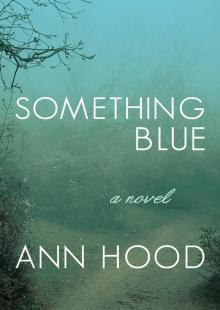 Something Blue
Something Blue Providence Noir
Providence Noir Somewhere Off the Coast of Maine
Somewhere Off the Coast of Maine Jewel of the East
Jewel of the East Queen Liliuokalani: Royal Prisoner
Queen Liliuokalani: Royal Prisoner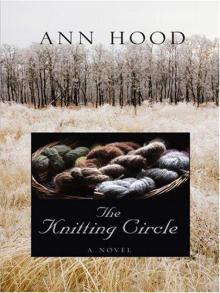 The Knitting Circle
The Knitting Circle Leonardo da Vinci: Renaissance Master
Leonardo da Vinci: Renaissance Master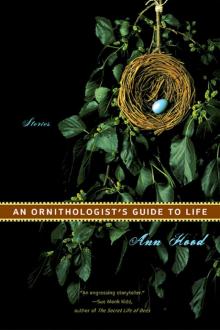 An Ornithologist's Guide to Life
An Ornithologist's Guide to Life The Red Thread
The Red Thread She Loves You (Yeah, Yeah, Yeah)
She Loves You (Yeah, Yeah, Yeah)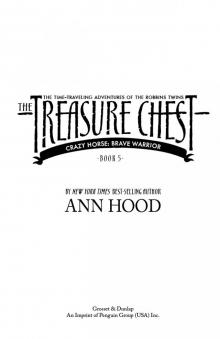 Brave Warrior
Brave Warrior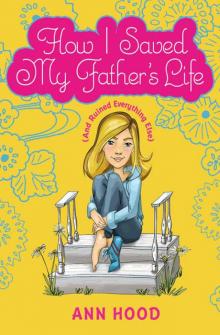 How I Saved My Father's Life (and Ruined Everything Else)
How I Saved My Father's Life (and Ruined Everything Else) An Italian Wife
An Italian Wife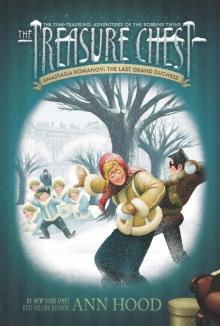 Anastasia Romanov: The Last Grand Duchess #10
Anastasia Romanov: The Last Grand Duchess #10 Prince of Air
Prince of Air Amelia Earhart: Lady Lindy
Amelia Earhart: Lady Lindy Places to Stay the Night
Places to Stay the Night Little Lion
Little Lion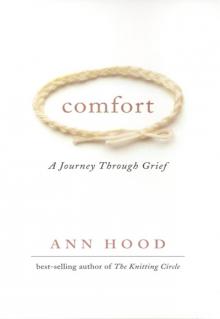 Comfort
Comfort Angel of the Battlefield
Angel of the Battlefield